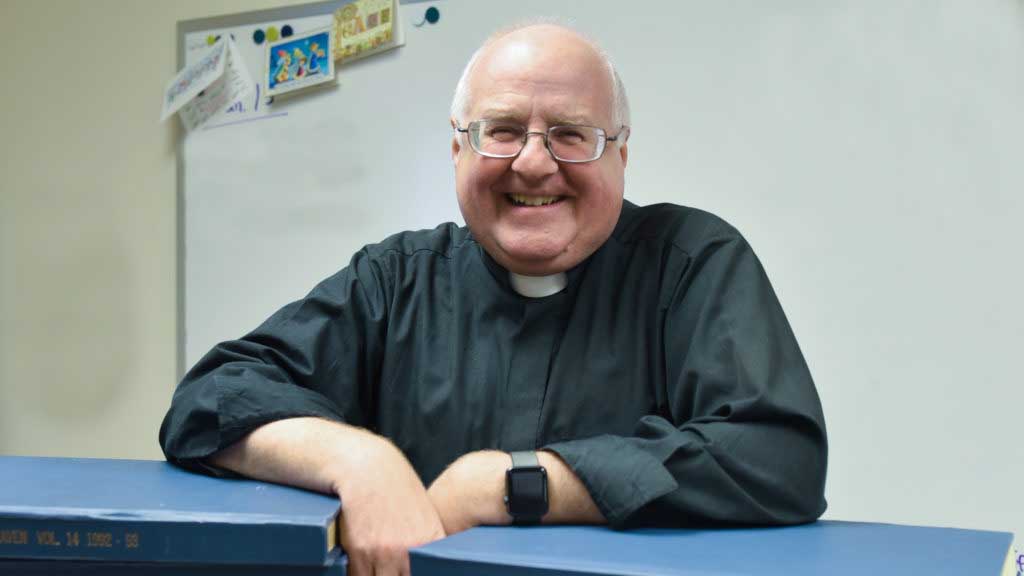
by Father Mark Goldasich
Ah, ‘twas an ill-willie creature, and it had every reason to be so.
The creature was a cat, and said cat was the pet of a woman that I’d come to administer the sacrament of the anointing of the sick to. (Uh, to the woman, not the cat!)
As I was almost ready to start, I noticed that the carpet that I was standing on was extremely soft. Suddenly, the “carpet” emitted a loud and painful yowl, and, to my horror and embarrassment, I’d realized I’d just stepped on the poor cat. The woman’s two daughters and granddaughters burst into laughter as the aggrieved cat skittered under a bed.
I looked behind me to see two glowering yellow eyes boring holes into me. And the first few minutes of the sacrament were accompanied by a guttural feline chorus. What I’m sure was feral billingsgate honestly gave me the collywobbles, and that’s no taradiddle!
At this point, are you totally bumfuzzled?
What a wonderous thing is the English language. Let me clarify some of those unusual words:
• “Ill-willie” means “having an unfriendly disposition.”
• “Billingsgate” means “coarsely abusive language” and its origin is from an actual gate in London where there was a fish market loaded with fishmongers whose language might even make a sailor blush.
• “Collywobbles” means a “pain in the abdomen; a bellyache.” It probably came from the Latin word for cholera that maybe made you wobble.
• “Taradiddle” means “a lie.” Its origin is from the town of Taradiddle, Ireland, which really doesn’t exist. You see, it’s a lie!
• “Bumfuzzled” means “confused; perplexed.”
Why am I using such obscure words? Well, it’s to celebrate Dictionary Day which was on Oct. 16, the birthday of Noah Webster in 1758. He was most famous for his “An American Dictionary of the English Language” that contained some 70,000 words. An estimate of how many English words there are today would add some 400,000 to that original number.
Language is a living thing. That’s why new words are added to dictionaries each year. A few of this year’s entries are:
• bed rotting: spending many hours in bed during the day, often with snacks or electronic devices, as a voluntary retreat from stress or anxiety
• bussin’: great; wonderful; amazing
• greedflation: a rise in prices or rents . . . caused by corporate executives or boards of directors, property owners, etc., solely to increase profits that are already healthy or excessive.
Of God’s many gifts to us, language is one that’s taken for granted or abused. Our ability to communicate, compliment, instruct, express love and gratitude, tell stories and bring laughter is often overshadowed by words we use to demean, confuse, alienate and hurt.
The best place to “clean up our language” is by immersing ourselves in the Bible, the word of God. Second best is prayer, especially exploring the rich treasury of Catholic prayers and methods. Third is to expand our knowledge of the faith by reading spiritual books and literature (like The Leaven). A fourth way is to educate ourselves and our families on “Catholic terms” like ambo, pyx, aspergillum, thurible, chasuble, alb, ambry and sacrarium. (How many did you know?)
I’m always on a quest to learn new words but you don’t have to be an editor to do that. Whenever you come across a new word, pause and find out what it means. Never stop being curious when reading or listening to a homily, class or podcast.
Someone once said: “Words are seeds that do more than blow around. They land in our hearts and not the ground. Be careful what you plant and what you say. You might have to eat what you planted one day.”

